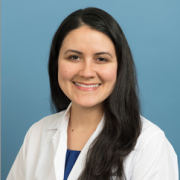Making the Transition from the Clinic to Public Health
I spent several years working as a family medicine physician in Los Angeles. Many of my patients were Spanish-speaking and low-income individuals, a large portion of whom suffered from obesity, diabetes, and other chronic conditions. I found that simply advising patients to “eat a healthy diet and exercise” did not lead to improved health measures. By embracing a holistic approach, I was able to find the root cause of my patients’ health problems. Many of my patients lived in neighborhoods without a nearby grocery store to buy fresh fruit and vegetables and did not understand how to read nutrition labels. Over a series of clinic appointments, I would work closely with my patients to find ways to address barriers to healthy eating and exercise. My clinical experiences inspired me to go beyond the clinic walls to find ways to address the social determinants of health that were contributing to my patients’ poor health outcomes.
When the COVID-19 pandemic began in 2020, I made the decision to move to my hometown area in Central California. As a public health trained physician, I wanted to give back to the region where I was raised and assist with local programs aimed at mitigating the impact of COVID-19 on vulnerable communities. I began working with the Fresno County Department of Public Health (FCDPH) and helped coordinate the department’s efforts to protect farmworkers against COVID-19 by making COVID-19 tests and vaccines more accessible in the rural areas of the county. As the daughter of Mexican immigrant farmworkers, I know firsthand the challenges that many farmworkers face when accessing health care. My parents were monolingual Spanish speakers and due to their language barrier, they had difficulty navigating the healthcare system.
In Fresno County, 17.8% of the population does not have a usual source of health care compared to 13.9% for California. This is due to multiple factors, including lack of accessible transportation in the region’s rural areas and as well as a shortage of medical providers (1). Such healthcare challenges contribute to the populations high rates of diabetes and other chronic conditions. Given that individuals with chronic conditions such as diabetes and obesity are at higher risk of developing adverse health complications of COVID-19, protecting farmworkers was critical (2).
Due to communal living conditions and frequent carpooling to work, many farmworkers that resided in rural areas were at a high risk of becoming infected with COVID-19. When the COVID-19 vaccines became available to the public, an innovative and culturally sensitive approach was needed to deliver the COVID-19 vaccines to our essential farmworkers. We collaborated with over 20 community-based organizations, several Federally Qualified Health Centers, and various agriculture facilities in Fresno County to organize COVID-19 vaccination mobile clinics for farmworkers at their workplaces. Community health workers educated farmworkers about the importance of the COVID-19 vaccines while medical providers utilized their mobile units to administer the COVID-19 vaccines to farmworkers. Through these partnerships, over 35,000 COVID-19 vaccine doses have been administered to farmworkers at their workplace in Fresno County.
In January 2022, I was appointed by the Fresno County Board of Supervisors to be the next Deputy Health Officer for Fresno County. In this position, I strive to build upon our department’s COVID-19 pandemic work and strengthen existing multi-sectoral collaborations to develop sustainable interventions that reduce the burden of chronic diseases among vulnerable communities in Central California. Given our success of vaccinating farmworkers at their workplace, I am now helping the Fresno County Department of Public health develop the ‘Rural Mobile Health’ program, which will offer health screenings (such as for diabetes or high blood pressure) to Fresno County residents living in rural areas and to farmworkers at their workplace. The ‘Rural Mobile Health’ program, which FCDPH aims to launch in early January 2023, will also engage community health workers to provide education on common chronic diseases and connect patients to local primary care physicians.
In my new role, I have become a trusted spokesperson on various health issues throughout the Central Valley region and strive to provide the community with evidence-based medical information in English and Spanish. As a member of the health department’s leadership team, I help address local public health challenges by focusing on identifying the root causes of these issues. I will continue to advocate for the area’s vulnerable communities by promoting innovative solutions that increase health care access and health equity.
1. Fresno County Community Health Needs Assessment 2020. https://www.co.fresno.ca.us/home/showpublisheddocument/44681/637273059301000000
2. Centers for Disease Control and Prevention. “People with Certain Medical Conditions.” People with Certain Medical Conditions | CDC. Accessed November 29, 2022.
Trinidad Solis, MD, MPH is the Deputy Health Officer for the Fresno County Department of Public Health. She is also board certified in Family Medicine. Follow Dr. Solis on Instagram @dr.trinidad.solis

